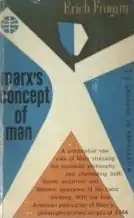Marx's Concept of Man
Marx's Concept of Man is a 1961 book about Karl Marx's theory of human nature by the psychoanalyst Erich Fromm. The work sold widely thanks to the popularity of Marx's early writings, which was a product of the existentialism of the 1940s.
 Cover of the 1961 paperback edition | |
| Author | Erich Fromm |
|---|---|
| Country | United States |
| Language | English |
| Subject | Marxist humanism, Marx's theory of human nature |
| Publisher | Frederick Ungar Publishing Co. |
Publication date | 1961 |
| Media type | Print (Hardcover and Paperback) |
| Pages | 263 |
| ISBN | 978-1472513953 |
Summary
Fromm provides selections from several of Marx's works. He also praises Reason and Revolution (1941), one of Herbert Marcuse's books on Georg Wilhelm Friedrich Hegel and Raya Dunayevskaya's Marxism and Freedom: From 1776 Until Today (1958).[1] Fromm briefly discusses the Marxist philosopher György Lukács, noting that in History and Class Consciousness (1923) Lukács viewed Marx as an "eschatological thinker."[2]
Reception
Marx's Concept of Man sold widely because the 1940s fashion for existentialism made Marx's early writings popular, according to the political scientist David McLellan, who considered Fromm's work a typical example of the favorable reception of the young Marx.[3] Alexander Welsh reviewed Marx's Concept of Man in The New Republic.[4] The philosopher Hazel Barnes compared Fromm's view of Marx and Marxism to that of the philosopher Jean-Paul Sartre.[5] Rainer Funk wrote that the Economic and Philosophic Manuscripts of 1844 were published for the first time in English in Fromm's work, the translation by Bottomore having been done at Fromm's suggestion.[6]
References
- Fromm 1975, p. ix.
- Fromm 1975, p. 69.
- McLellan 1975, p. 79.
- Welsh 1961, p. 22.
- Barnes 1968, pp. xxix–xxx.
- Funk 2000, p. 147.
Bibliography
- Books
- Barnes, Hazel; Sartre, Jean-Paul (1968). Search for a Method. New York: Vintage Books. ISBN 0-394-70464-9.
- Fromm, Erich (1975). Marx's Concept of Man. New York: Frederick Ungar Publishing Co. ISBN 0-8044-6161-9.
- Funk, Rainer (2000). Erich Fromm: His Life and Ideas. New York: Continuum International Publishing Group. ISBN 0-8264-1224-6.
- McLellan, David (1975). Marx. Glasgow: Fontana. ISBN 0-333-63947-2.
- McLellan, David (1995). Karl Marx: A Biography. London: Papermac. ISBN 0-333-63947-2.
- McLellan, David (1995). The Thought of Karl Marx: An Introduction. London: Papermac. ISBN 0-333-63948-0.
- Journals
- Welsh, Alexander (1961). "Fromm's Effort to Rescue Marx (Book)". The New Republic. 145 (24). – via EBSCO's Academic Search Complete (subscription required)